The sequence of string figures continues and I have below noted
the page numbers for the Makoi stations in his 1-day
cycle around the island. The kaikai names for his
stations are very alike
to the names he gave but not always identical:
| E:38 |
1 Ko Apina
Iti |
2 Hanga
O Uo |
3 Hanga
Roa |
4 Okahu |
5 Ra
Tahai |
6 Ahu
Akapu |
|
7
Kihikihi Rau Mea |
8
Renga A Tini |
9
Vai A Mei |
10
Rua A Ngau |
11
Roro Hau |
12
Vai Poko |
13
Ko Te Hereke |
| E:39 |
14 Hatu
Ngoio |
15 Ara
Koreu |
16 Hanga
Kuokuo |
17 Opata
Roa |
18 Vai
Tara Kai Uo |
19 Hia
Uka |
20 Hanga
Ohiro |
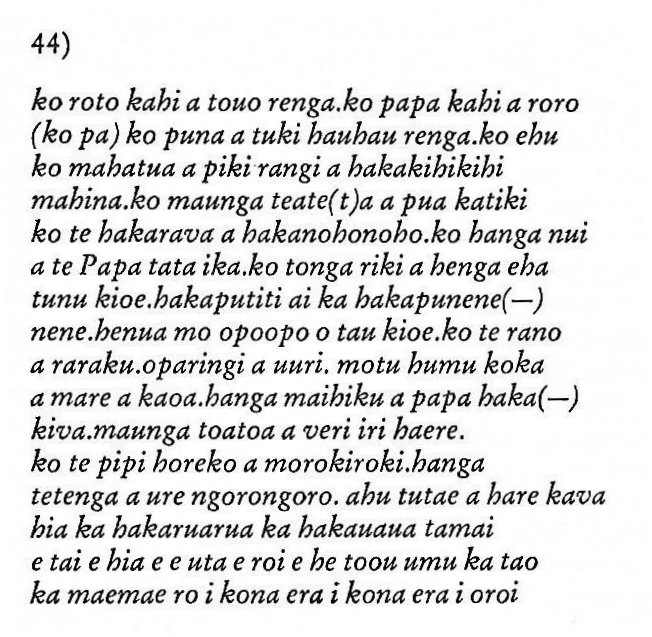
| 21
Ko Roto Kahi |
22
Ko Papa Kahi |
23
Ko Puna A Tuki |
24
Ko Ehu Ko Mahatua |
25
Ko Maunga Teatea |
| 26
Ko Te Hakarava |
27
Ko Hanga Nui |
28
Ko Tongariki |
29
Ko Te Rano A Raraku |
30 Ko Oparingi |
31 Ko Motu Kumu
Koka |
|
APRIL 1
(91) |
2 |
3 |
4 (*14) |
 |
 |
 |
 |
|
Ga1-11 |
Ga1-12 |
Ga1-13 |
Ga1-14 |
|
HAEDUS II = η Aurigae
(75.9) |
5h (76.1)
ε
Leporis (76.0),
CURSA
=
β
Eridani
(76.4),
λ
Eridani (76.7) |
μ
Aurigae, μ Leporis (77.6) |
ĸ Leporis (78.0),
RIGEL
(Foot) =
β
Orionis
(78.1),
Flaming Star = IC405
(78.2),
CAPELLA
(Little Goat) =
α
Aurigae
(78.4),
ο
Columbae,
τ
Orionis (78.8)
*37.0 = *78.4 - *41.4
THUBAN (α Draconis)
|
|
... In view of
the almost universal prevalence of the Pleiades year
throughout the Polynesian area it is surprising to
find that in the South Island and certain parts of
the North Island of New Zealand and in the
neighboring Chatham Islands, the year began with the
new Moon after the yearly morning rising, not of the
Pleiades, but of the star Rigel in Orion ...
 |
|
June 4 |
5 |
6 (157) |
7 (*78) |
|
°May 31
(151) |
°June 1 |
2 (*73) |
3 |
|
'May 8
(128) |
9 |
10 (*50) |
11 |
|
"April
24 (114) |
Vaitu Nui
25 (115)
(E:17) |
26 (*36) |
27 |
|
... On the twenty-fifth day [raa]
of the first month ('Vaitu Nui'), Ira and Makoi set
sail. (i te rua te angahuru marima raa o te vaitu
nui.i oho.mai ai a ira.ko Makoi).
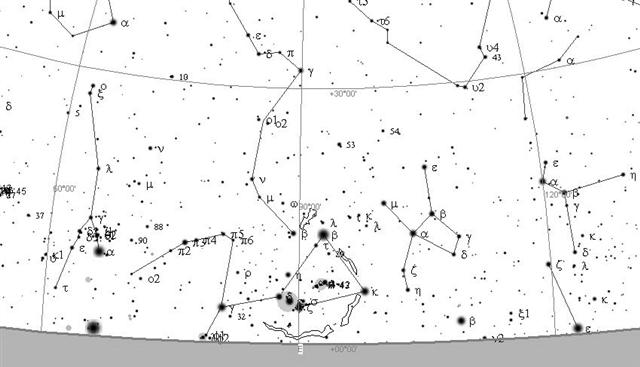 |
|
DAY 75 -
64 = 11 |
12 (=
115 - 84 - 19) |
13 |
14 |
|
11 Roro Hau
a mana ai rea |
12 Vai Poko
a raa mata turu |
13 Ko Te Hereke
a kino ariki |
14 Hatu Ngoio
a taotao ika |
|
APRIL 5 |
6
(96) |
7 |
 |
 |
 |
|
Ga1-15 |
Ga1-16 |
Ga1-17 |
|
λ Aurigae (79.0), λ Leporis (79.6), ρ Aurigae
(79.7)
ARCTURUS (α Bootis) |
Shur-narkabti-sha-iltanu-5 (Star in the Bull
towards the north)
σ
Aurigae (80.4),
BELLATRIX (Female Warrior) = γ Orionis, SAIF AL
JABBAR (Sword of the Giant) = η Orionis
(80.7),
ELNATH
(The Butting One) =
β
Tauri = γ Aurigae
(80.9) |
ψ
Orionis (81.1),
NIHAL (Thirst-slaking Camels) = β Leporis
(81.7) |
|
June
8 |
9 |
10
(161) |
|
... The
month, which takes its name from Juppiter the
oak-god, begins on June 10th and ends of July
7th. Midway comes St. John's Day, June 24th, the
day on which the oak-king was sacrificially
burned alive. The Celtic year was divided into
two halves with the second half beginning in
July, apparently after a seven-day wake, or
funeral feast, in the oak-king's honour
... |
|
°June 4 |
5
(156) |
6
(*77) |
|
'May
12 |
13 |
14
(*54) |
|
"April 28 |
29 |
30
(*40) |
|
DAY
79 - 64 = 15 |
16 |
17 |
|
15 Ara Koreu
a
pari maehaeha |
16 Hanga
Kuokuo
a
vave renga |
17 Opata Roa
a
mana aia |
|
He hatu i te vanaga rivariva
ki te kio o poki ki ruga ki
te opata, they
gave the refugees the good advice not to climb
the precipice.
He-kî e Tori: maaku-á e-ea ki
te manu, e-poko i te po i ruga i
te opata. Tori
said: I shall go and catch birds at night, up on
the cliff. |
|
8 (*18) |
APRIL 9 (*19) |
10 (100) |
 |
 |
 |
|
Ga1-18 |
Ga1-19 |
Ga1-20 |
|
KHUFU
MINTAKA (Belt) =
δ
Orionis,
υ
Orionis (82.4),
χ
Aurigae (82.5),
ε
Columbae (82.6)
*41 = *82.4 - *41.4 |
KHAFRE
Al Hak'ah-3 (Brand) /
Mrigashīrsha-5 (Stag's Head) /
Turtle Head-20 (Monkey) /
Mas-tab-ba-tur-tur (Little Twins)
ARNEB = α Leporis, Crab Nebula = M1 Tauri
(83.0,
φ¹
Orionis (83.1),
HEKA
= λ Orionis, Orion Nebula = M42
(83.2),
φ²
Orionis (83.6),
ALNILAM (String of Pearls) = ε Orionis
(83.7) |
MENKAURE
Three Stars-21 (Gibbon) /
Shur-narkabti-sha-shūtū-6 (Star in the Bull
towards the south)
/ ANA-IVA-9
(Pillar of exit)
HEAVENLY GATE = ζ Tauri,
ν
Columbae (84.0),
ω
Orionis (84.2),
ALNITAK (Girdle) = ζ Orionis,
PHAKT (Phaet) = α Columbae
(84.7) |
|
11 |
June 12 |
13 (*84) |
|
7 |
°June 8 |
9 (*80) |
|
15 (135) |
'May 16 (136) |
17 |
|
"May 1 (121) |
"May 2 |
3 (133) |
|
DAY 82 - 64 = 18 |
19 (= 115 - 84 - 12) |
20 |
|
18 Vai Tara Kai Uo
a ngao roaroa a ngao tokotokoa |
19 Hia
Uka
a hakairiiri a hakaturuturu |
20 Hanga
Ohiro
a pakipaki renga |
|
... The
original Arabic name, Al Hak'ah, a
White Spot, was from the added faint light
of the smaller φ¹and
φ² in the
background, and has descended to us as
Heka and Hika ...
Uka.
Uka hoa,
female friend, companion.
Ukauka:
1. Firewood. 2. Leathery, tough. PS Mgv.:
ukauka,
hard to chew. Mq.:
ukakoki,
leathery. Ta.:
uaua, id. Sa.:
u'a,
tough, tenacious, glutinous. To.:
uka,
sticky. Niuē;
uka, tough. Viti: kaukamea,
metal. Churchill. |
|
... the
real surprise revealed by Bauval's
astronomical calculations was this: despite
the fact that some aspects of the Great
Pyramid did relate astronomically to the
Pyramid Age, the Giza monuments as a whole
were so arranged as to provide a picture of
the skies (which alter their appearance down
the ages as a result of the precession of
the equinoxes) not as they had looked in the
Fourth Dynasty around 2500 BC, but as they
had looked - and only as they had
looked - around the year 10,450 BC
...
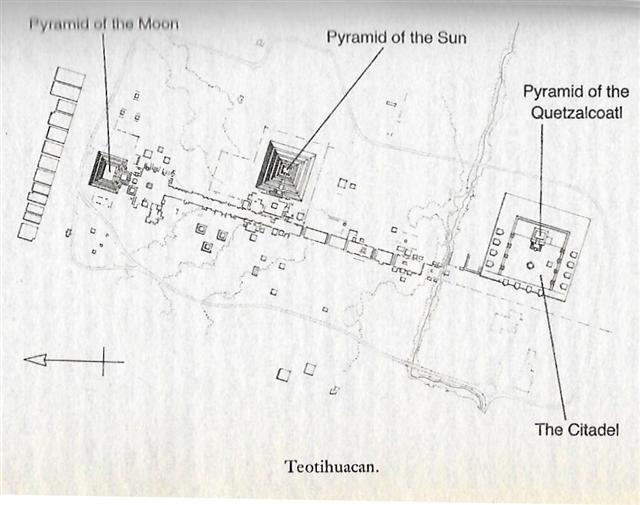
.jpg) |
Rano Raraku (where the great stone statues 'were born')
corresponded to number 29 (→ Mercury).
... Ganz ähnlich is der Name 'Gott von Duazag' des Gottes
Nabū ... zu erklären.
Er bezeichnet ihn als den Gott des Wachtstums, welches als aus
dem Osten stammend betrachtet wird, weil die Sonne, die das
Wachstum bringt, im Osten aufgeht.
Dass aber Nabū als Ost-Gott aufgefasst wurde, hängt damit
zusammen, dass sein Stern, der Mercur, nur im Osten oder Westen
sichtbar ist ...
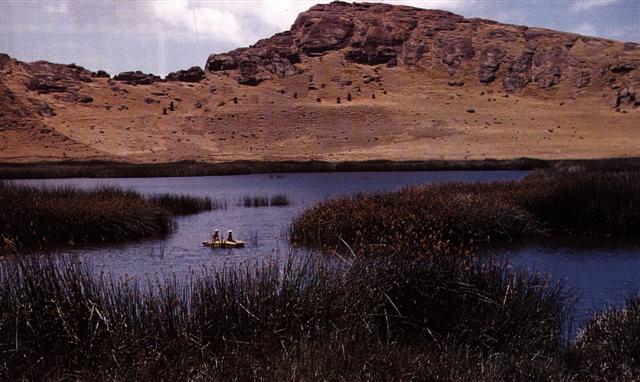
Counting (hia) 5 days ahead from Rigel will lead us to
Hika (Heka) - which presumably was corresponding to 19 Hia Uka a
hakairiiri a hakaturuturu. And another pair of handfuls of
days will then lead us to 29 Te Rano A Raraku where glyph
line Ga1 was ending (200 days before the end of side a of the
tablet).
.jpg)
|
APRIL 11 |
12 |
13 |
14 (104) |
15 |
16 (*26) |
 |
 |
 |
 |
 |
 |
|
Ga1-21 |
Ga1-22 |
Ga1-23 |
Ga1-24 |
Ga1-25 |
Ga1-26 |
|
ο
Aurigae (85.8), γ Leporis (85.9)
YANG MUN
(α Lupi)
|
μ
Columbae,
SAIPH
(Sword) =
κ
Orionis
(86.5),
τ
Aurigae,
ζ
Leporis (86.6) |
υ Aurigae (87.1), ν Aurigae (87.2),
WEZN (Weight) = β Columbae,
δ Leporis (87.7),
TZE (Son) = λ Columbae
(87.9) |
Ardra-6 (The Moist One) /
ANA-VARU-8 (Pillar to sit by)
χ¹
Orionis,
ξ
Aurigae (88.1),
BETELGEUZE
=
α
Orionis
(88.3),
ξ
Columbae (88.5),
σ
Columbae (88.7) |
η
Leporis (89.0),
PRAJA-PĀTI (Lord of Created Beings) =
δ
Aurigae,
MENKALINAN (Shoulder of the Rein-holder) = β
Aurigae, MAHASHIM (Wrist) = θ Aurigae,
and
γ
Columbae (89.3),
π
Aurigae (89.4),
η
Columbae (89.7)
*48.0 = *89.4 - *41.4 |
μ
Orionis (90.3), χ² Orionis (90.5) |
|
June 14
(165) |
15 |
16 |
17 (168) |
18 |
19 |
|
°June 10
(161) |
11 |
12 |
13 (164) |
14 |
15 (*86) |
|
'May 18 (*58) |
19 |
20 (140) |
21 |
22 |
23 (*63) |
|
"May 4 (*54) |
5 |
6 |
7 (127) |
8 |
9 (*49) |
|
DAY 85 -
64 = 21 |
22 |
23 |
24 |
25 |
26 |
|
21
Ko Roto Kahi
a touo
renga |
22
Ko Papa Kahi
a roro
(ko pa) |
23
Ko Puna A Tuki
hauhau
renga |
24
Ko Ehu Ko Mahatua
a piki
rangi a hakakihikihi mahina |
25
Ko Maunga Teate(t)a
a pua
katiki |
26
Ko Te Hakarava
a
hakanohonoho |
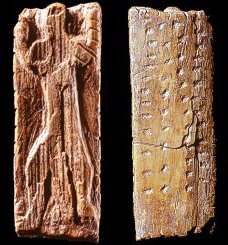
... The earliest
depiction that has been linked to the constellation
of Orion is a prehistoric (Aurignacian) mammoth
ivory carving found in a cave in the Ach valley in
Germany in 1979. Archaeologists have estimated it to
have been fashioned approximately 32,000 to 38,000
years ago ... The artist cut, smoothed and carved
one side (A) and finely notched the other
side (B) and the edges. Side A
contains the half-relief of an anthropoidal figure,
either human or a human-feline hybrid, known as the
'adorant' because its arms are raised as if in an
act of worship.
|
Egyptian jubilation |
 |
Phoenician
he |
 |
Greek
epsilon |
Ε (ε) |
|
Wikipedia
points at the Egyptian gesture with arms
held high as a Sign of jubilation, which
may have been the origin (via Phoenician
he) of epsilon.

 |
On side
B together with the four edges is a series
of notches that are clearly set in an intentional
pattern. The edges contain a total of 39 notches in
groups of 6, 13, 7 and 13. A further 49 notches on
side B are arranged in four vertical lines
of 13, 10, 12 and 13 respectively plus a further
notch that could be in either of the middle two
lines ... The grouping of the notches on the plate
suggests a time-related sequence. The total number
of notches (88) not only coincides with the number
of days in 3 lunations (88.5) but also approximately
with the number of days when the star Betelgeuse (α
Ori) disappeared from view each year between its
heliacal set (about 14 days before the spring
equinox around 33,000 BP) and its heliacal rise
(approximately 19 days before the summer solstice).
Conversely, the nine-month period when Orion was
visible in the sky approximately matched the
duration of human pregnancy, and the timing of the
heliacal rise in early summer would have facilitated
a ‘rule of thumb’ whereby, by timing conception
close to the reappearance of the constellation, it
could be ensured that a birth would take place after
the severe winter half-year, but leaving enough time
for sufficient nutrition of the baby before the
beginning of the next winter. There is a resemblance
between the anthropoid on side A and the
constellation Orion. None of these factors is
convincing when taken in isolation, because of the
high probability that apparently significant
structural and numerical coincidences might have
arisen fortuitously. However, taken together they
suggest that the anthropoid represented an asterism
equivalent to today’s constellation of Orion, and
that the ivory plate as a whole related to a system
of time reckoning linked to the moon and to human
pregnancy. If so, then ethnographic comparisons
would suggest that the Geißenklösterle
culture related their ‘anthropoid’ asterism to
perceived cycles of cosmic power and fertility ...
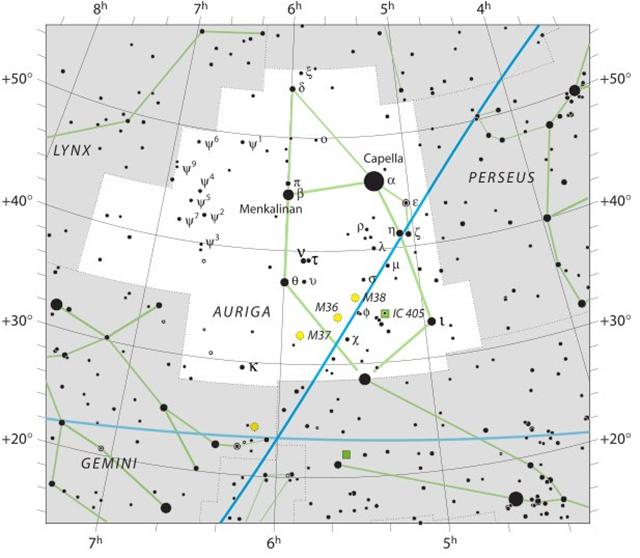 |
|
APRIL 17
(107) |
18 |
19 |
20 (*30) |
21 |
 |
 |
 |
 |
 |
|
Ga1-27 |
Ga1-28 |
Ga1-29 |
Ga1-30 |
Ga2-1 |
| CLOSE TO THE SUN: |
|
6h (91.3)
ν
Orionis (91.4),
θ
Columbae (91.5),
π
Columbae (91.6)
*50.0 = *91.4 - *41.4 |
ξ
Orionis
(92.5) |
Al Han'ah-4 (Brand) /
Maru-sha-pu-u-mash-mashu-7 (Front of the Mouth of
the Twins)
TEJAT PRIOR
=
η
Gemini
(93.4),
γ
Monocerotis (93.5),
κ
Aurigae (93.6),
κ
Columbae (93.8)
*52.0 = *93.4 - *41.4 |
FURUD
= ζ Canis Majoris
(94.9) |
Well-22 (Tapir) /
Arkū-sha-pu-u-mash-mashu-8
(Back of the Mouth of the Twins)
δ
Columbae (95.2),
TEJAT POSTERIOR =
μ
Gemini,
MIRZAM (The Roarer) = β Canis Majoris
(95.4),
CANOPUS
(Canopy) =
α
Carinae
(95.6),
ε
Monocerotis (95.7),
ψ1
Aurigae (95.9)
*54.0 = *95.4 - *41.4 |
|
June 20 |
SOLSTICE |
22 (*93) |
23 (174) |
ST
JOHN'S DAY |
|
°June 16 |
17 (168) |
18 |
19 |
20 (*91) |
|
'May 24
(144) |
25 |
26 |
27 |
28 (*68) |
|
"May 10
(130) |
11 |
12 |
13 |
14 (*54) |
|
DAY 91 -
64 = 27 |
28 |
29 |
30 |
31 |
|
27
Ko Hanga Nui
a te
Papa tata ika |
28
Ko Tonga Riki
a henga
eha tunu kioe. hakaputiti ai ka hakapunenenene.henua
mo opoopo o tau kioe. |
29
Ko Te Rano A Raraku |
30 Oparingi |
31 Oparingi
a
uuri |
|
... The
Pythagoreans make Phaeton fall into Eridanus,
burning part of its water, and glowing still at the
time when the Argonauts passed by. Ovid stated that
since the fall the Nile hides its sources. Rigveda
9.73.3 says that the Great Varuna has hidden the
ocean. The Mahabharata tells in its own style why
the 'heavenly Ganga' had to be brought down. At the
end of the Golden Age (Krita Yuga) a class of
Asura who had fought against the 'gods' hid
themselves in the ocean where the gods could not
reach them, and planned to overthrow the government.
So the gods implored Agastya (Canopus, alpha
Carinae = Eridu) for help. The great Rishi did as he
was bidden, drank up the water of the ocean, and
thus laid bare the enemies, who were then slain by
the gods. But now, there was no ocean anymore!
Implored by the gods to fill the sea again, the Holy
One replied: 'That water in sooth hath been digested
by me. Some other expedient, therefore, must be
thought of by you, if ye desire to make endeavour to
fill the ocean ...
 |
|
CLOSE TO THE FULL MOON: |
|
OCT
17 (290) |
18 |
19 |
20 |
21 |
|
Dec
20 |
SOLSTICE |
22 |
23
(357) |
CHRISTMAS EVE |
|
ZHŌNGSHĀN = ο Herculis
(274.0), π Pavonis (274.6) |
ι Pavonis (275.1),
POLIS (Foal) = μ Sagittarii (275.9)
MENKAR (α Ceti) |
η Sagittarii (276.9) |
Purva Ashadha-20 (Elephant Tusk, Fan, Winnowing
Basket) |
|
KAUS MEDIUS = δ Sagittarii,
κ Lyrae (277.5),
TUNG HAE (Heavenly Eastern Sea) = η Serpentis
(277.7),
SHAOU PIH (Minor Minister) = φ Draconis
(277.8),
KWEI SHE = χ Draconis
(277.9) |
φ
Oct. (278.1),
KAUS AUSTRALIS = ε Sagittarii
(278.3),
ξ
Pavonis (278.4),
AL ATHFAR (The Talons of the Falling Eagle)
=
μ Lyrae
(278.6)
*237.0 = *278.4 - *41.4 |
There is a high probability that
apparently significant structural and numerical coincidences
might have arisen fortuitously. However, taken together they
suggest 28 Ko Tonga Riki with its remarkably long comment
(long like a solstice) - a henga eha tunu kioe. hakaputiti ai
ka hakapunenenene.henua mo opoopo o tau kioe - preceded the
birth place beginning at the decapitated figure in day 29.
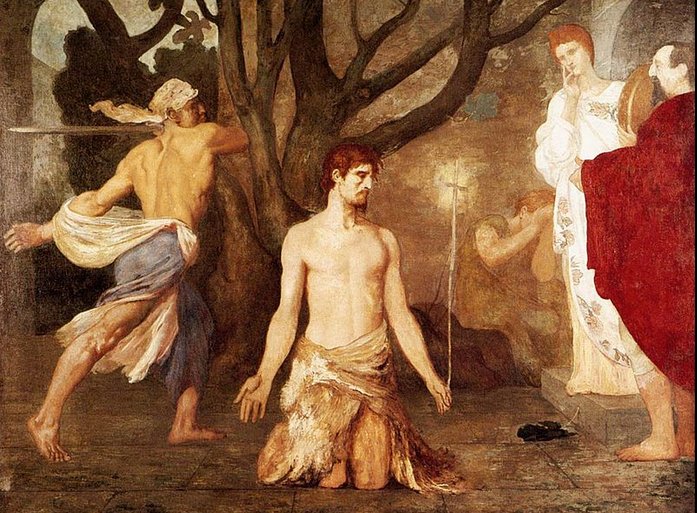
|








.jpg)

.jpg)








